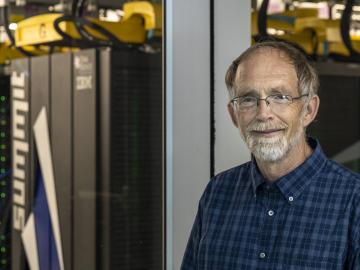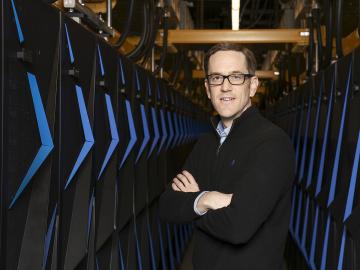Filter News
Area of Research
News Topics
- (-) High-Performance Computing (7)
- 3-D Printing/Advanced Manufacturing (15)
- Advanced Reactors (1)
- Artificial Intelligence (5)
- Big Data (1)
- Bioenergy (13)
- Biology (17)
- Biomedical (6)
- Biotechnology (5)
- Buildings (2)
- Chemical Sciences (20)
- Climate Change (10)
- Composites (4)
- Computer Science (12)
- Coronavirus (7)
- Critical Materials (8)
- Cybersecurity (4)
- Decarbonization (5)
- Energy Storage (20)
- Environment (16)
- Exascale Computing (1)
- Frontier (2)
- Fusion (3)
- Grid (3)
- Isotopes (5)
- ITER (1)
- Machine Learning (3)
- Materials (41)
- Materials Science (37)
- Microscopy (12)
- Molten Salt (2)
- Nanotechnology (22)
- National Security (3)
- Net Zero (2)
- Neutron Science (21)
- Nuclear Energy (2)
- Partnerships (9)
- Physics (14)
- Polymers (6)
- Quantum Computing (1)
- Quantum Science (10)
- Renewable Energy (1)
- Security (1)
- Simulation (4)
- Summit (4)
- Sustainable Energy (10)
- Transformational Challenge Reactor (1)
- Transportation (4)
Media Contacts

Scientists at ORNL used their expertise in quantum biology, artificial intelligence and bioengineering to improve how CRISPR Cas9 genome editing tools work on organisms like microbes that can be modified to produce renewable fuels and chemicals.

Wildfires are an ancient force shaping the environment, but they have grown in frequency, range and intensity in response to a changing climate. At ORNL, scientists are working on several fronts to better understand and predict these events and what they mean for the carbon cycle and biodiversity.

Shih-Chieh Kao, manager of the Water Power program at ORNL, has been named a fellow of the American Society of Civil Engineer’s Environmental & Water Resources Institute, or EWRI.

Colleen Iversen, ecosystem ecologist, group leader and distinguished staff scientist, has been named director of the Next-Generation Ecosystem Experiments Arctic, or NGEE Arctic, a multi-institutional project studying permafrost thaw and other climate-related processes in Alaska.

Scientists at the Department of Energy’s Oak Ridge National Laboratory are leading a new project to ensure that the fastest supercomputers can keep up with big data from high energy physics research.

ORNL Corporate Fellow and Center for Nanophase Materials Sciences researcher Bobby Sumpter has been named fellow of two scientific professional societies: the Institute of Physics and the International Association of Advanced Materials.

The annual Director's Awards recognized four individuals and teams including awards for leadership in quantum simulation development and application on high-performance computing platforms, and revolutionary advancements in the area of microbial




